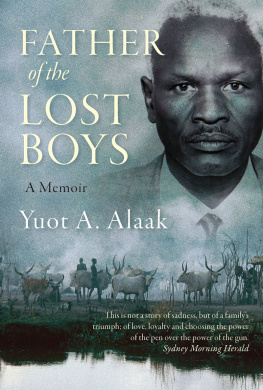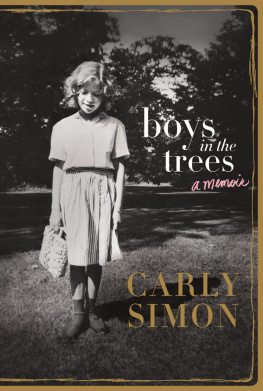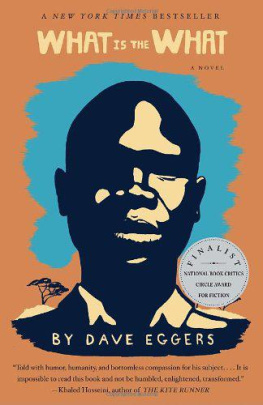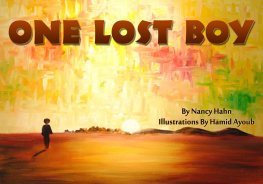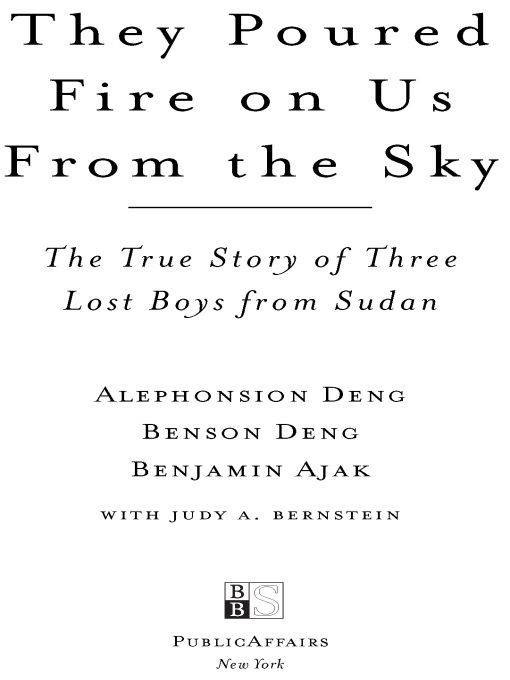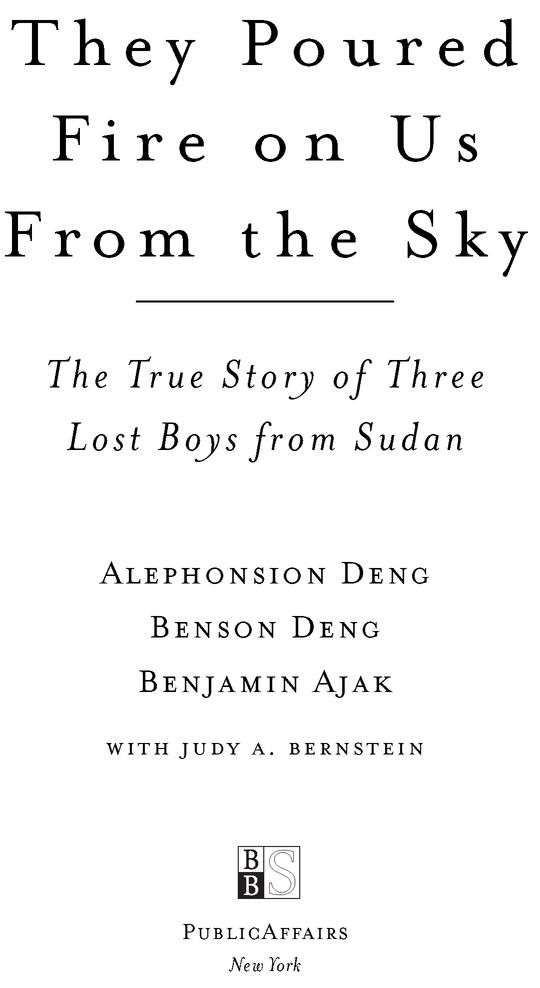Table of Contents
PRAISE FOR THEY POURED FIRE ON US FROM THE SKY
[T]he soft plainness of the young writers voices, combined with their moral insight, throws the surreal danger and strife into sharp relief. They speak for the Sudanese who cannot, to attest that although people always hoped and prayed for peace, peace never came.
San Diego Union Tribune
Although the experiences themselves deliver an indictment, the account is remarkably without condemnation or self-pity, and the boys exhibit an underlying innocence and purity.
Los Angeles Times
[F]ascinating and immediate, not least because of the guilelessness of the language and the particularly African use of metaphor and imagery.
New York Review of Books
In the same way that the Diary of Anne Frank will forever keep the plight of the children of the Holocaust alive, this book speaks on behalf of the millions of children in Africa who are victims of its genocides and witnesses to its atrocities.
North County Times
An amazing account of boys who managed to survive a terrifying ordeal... theres a kind of haunting beauty to their story... this book is an eye-opener.
Rocky Mountain News
[T]he book is at once an important addition to the contemporary dialogue on world affairs and a surprisingly lyrical account of coming of age under adverse conditions.... [This] is no mere historical document; it is a wise and sophisticated examination of the arbitrary cruelties and joys of being alive.
Minneapolis Star-Tribune
A powerful first-hand account of war as seen through the eyes of children. In an era of remote, televised wars, it is an important reminder of the immense devastation and impact on innocent victims.
Deepak Chopra
[The book] represent[s] genuine, heartfelt examples of what war does to young people and how they may adjust to life outside the country of their birth, especially the social and intellectual problems they experience.
Deseret Morning News
[A] harrowing account of war.
Booklist
[W]ell written, often poetic essays... this collection is moving in its descriptions of unbelievable courage.
Publishers Weekly
Dedicated to Monyde
and all of the children throughout time
whove been caught up in adult wars
2 4 6 8 10 9 7 5 3 1
When two elephants fight,
it is the grass that gets trampled.
AFRICAN PROVERB
The name Lost Boys came to be when our village was attacked by fierce Arab horsemen. We, little boys, spewed out of the blazing village like a colony of ants disturbed in their nest. We ran in different directions not knowing where we are going. We gathered some fruits for our breakfast and lunch. We, little boys, were so messy, all chaos and cries filling the dark, fiercely lightless night.
ALEPHONSION DENG
An Introduction to the Lost Boys
It was Joseph Jok, a caseworker in the San Diego offices of the International Rescue Committee, who introduced me to the authors of this book when he asked if Id like to mentor some Lost Boys of Sudan. Id read how twenty thousand or so boys, many no more than five or six years old, fled a thousand miles across Africas largest country. I was intrigued.
Id love to meet them, I told Joseph, who is a Sudanese refugee himself. But I have to be honest with you: Im not sure about the mentoring part.
I didnt want to admit that mentoring scared me. It was such a serious commitmentand to three young men who might need a great deal of help.
You could just show a couple of them around San Diego, Joseph suggested. You know, the zoo or Sea World. They need acculturation.
Being a part-time tour guide sounded much less threatening. Still, I worried about what I was getting into. They wouldnt be boys now, but young men, nineteen years or older, who had grown up in refugee camps without parents. I conjured up visions from William Goldings Lord of the Flies.
Relax, I told myself. Youre just showing them around town for a day or two, not adopting them. Acquainting these young men with our culture will be fun. Theyre coming from a place without cars, running water, or enough food to survive, to a land of freeways, faucets that spout water without being touched and so much food its probably our biggest health threat. Theyre being dropped from the sky into an utterly alien place, like that Coca-Cola bottle that shows up in South Africa in the movie The Gods Must Be Crazy.
So I set off with my twelve-year-old son, Cliff, to wait, rather nervously, on a couch in the International Rescue Committee offices to meet three refugee Lost Boys from Sudan.
Will they speak English? Cliff asks.
Oh yes, I answer, but becoming less sure as I look around the room at the eight or so desks that surround us, and the refugees, mostly families, huddled on chairs, muttering in strange tongues. Its a colorful scene, a full palette of skin tones and an Epcot of clothing and languages. Cliff is quiet and wide-eyed. The menagerie of people is nothing like what hes used to, where the faces are mostly white and occasional Spanish the only foreign language.
A few minutes later Joseph arrives with three Lost Boys. I dont know what Id expected, but they are not it. Tall, around six feet, they are dressed like prep students, have short-cropped hair, and beautiful, impossibly black, flawless skin. Cliff and I stand across from the three of them. I extend my hand to one young man who is wearing a bright yellow neon shirt and introduce Cliff and myself. He shakes my hand and Cliffs and says his name is Benson. The Lost Boy beside him, who looks so much like Benson they could brothers, holds out his hand. It sounds like he says Alfonso, but Im not sure, and it seems an unlikely name for someone from Africa, but then so does Benson. The third Lost Boy, who is the tallest by an inch or so, shakes our hands too. I understand his name clearly; its Lino.
As planned, we head for the car and something to eat. I whisper to Joseph to give me the names again and he tells me the one who looks so much like Benson is his brother, Alephonsion, and that I can call him Alepho.
Please put on your seat belts, I say when they climb into the back of my Explorer. As I prepare to pull out, I hear shuffling and look behind me. Would you like help?
Benson lifts the strap. Please, may I just hold it?
Cliff climbs into the backseat and helps them get snapped in. Accustomed to teenagers demanding reasons for things, I caution them about the seat belt law, police stopping us if they dont wear them and the threat of a ticket. My voice trails off when it dawns on me that Im painting America like some sort of police state. I must sound silly to young men whove just spent fifteen years surviving in a war zone.
As we drive toward the east part of San Diego, the avenue roughens with potholes that have sprouted like garden weeds. I havent been in this part of town for years and notice that the larger businesses, such as Sears and car dealers, have gone and the small stores have signssome handpaintedin more foreign languages than I can identify.
Alepho suddenly asks, You know Payson?


